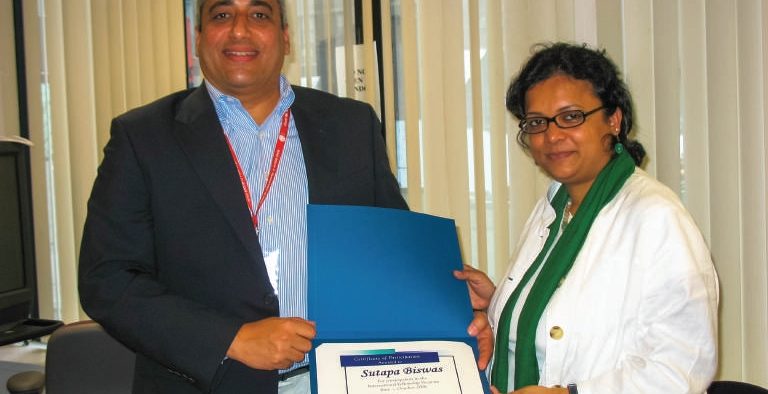Beating Cancer At Its Own Game

The Cancer Foundation of India focuses on cancer prevention and preventive research, besides running a counselling helpline for patients.
By ANILA MATHEW
Statistics show that one woman dies of cervical cancer every eight minutes in India. An estimated 2.5 million Indians suffer from the disease. Though options of curing the illness are expensive, traumatic and not always successful, and a vaccine can prevent it, India has still not awakened to the significance of prevention of cervical cancer. Not just cervical cancer, India lags behind in the prevention game for all kinds of cancer. This is where NGOs like the Kolkata-based Cancer Foundation of India step in, to prevent cancer through the concerted efforts of providing free screening opportunities, educating healthcare professionals, raising awareness about the disease, supporting cancer patients, disseminating information on prevention and diagnosis of cancer and policy advocacy.
Founded by research scientist Dr. Maqsood Siddiqi and documentary filmmaker Sutapa Biswas in 2002, CFI has been actively trying to translate scientific development and research for the benefit of the masses. “It is time that cancer public health is prioritized in India,” says Dr. Siddiqi. “Proper public education on risk factors and early signs coupled with the creation of adequate screening facilities is the need of the hour. Along with that, all efforts must be directed to develop facilities for early detection of common cancers linked with timely clinical followup. This alone can control the rising incidence of cancers in India.”
CFI does not intend to provide treatment services or funding for cancer patients. Instead, it focuses its energies on detecting cancer in its early stages through screening procedures and provides a strong platform for cancer prevention, in order to prevent a human being from becoming a statistic. Cancer not only destroys cells of the body but can also be financially devastating. Through the years, CFI has been trying to make policy changes at the governmental level to invest capital in screening for cancer, which, incidentally, is far cheaper than treating the terminal illness. Prevention and early diagnosis help in curing most of the common cancers seen in India i.e. cervical cancer, breast cancer, and oral cancer.
Biswas, Executive Director of CFI, says, “The government must focus on setting up more screening centers across the villages of India, instead of merely opening treatment centers, which most often do not have specialized physicians.” Efforts are also on to introduce specialized courses in MBBS courses for diagnosis of cancer, in order to help prepare physicians to recognize symptoms early on. CFI also strongly presses for tobacco control at the state level as its consumption has reached alarming levels. The NGO generates awareness of the dangers of tobacco and focuses on the implementation of anti-tobacco laws. At the national level, CFI is part of policy-making with regard to cervical cancer.
“THE GOVERNMENT MUST FOCUS ON SETTING UP MORE SCREENING CENTRES ACROSS THE VILLAGES OF INDIA, INSTEAD OF MERELY OPENING TREATMENT CENTRES.”
Sutapa Biswas Filmmaker & Executive Director, Cancer Foundation of India
The NGO faces its biggest difficulties in terms of lack of funding, the fact that most symptoms of cancer are rarely detected and the negative image associated with the dreaded illness. Screening for the disease would entail checking for the possibility of the disease without any overt symptoms and most Indians do not value such preventive measures. The organization has been advocating the channeling of funds from corporate houses and government schemes into popularising prevention rather than into treating advanced stages of the disease.
The NGO collaborates with international and national bodies such as the WHO and the ICMR for various research projects. CFI translates preventive research conducted in lab experiments onto human population-based studies and also identifies indigenous risk factors for high-incidence cancers. It also focuses on developing low-cost diagnostic methods with appropriate technology for the detection of cancer such as studies to confirm if the three-dose HPV vaccine for cervical cancer can be reduced to two doses, thus cutting costs. The NGO discovered the efficacy of curcumin to reverse the damage caused to DNA due to arsenic. The projects conducted by CFI work within specific timelines.
Regular follow-up and monitoring procedures are also conducted to check the efficacy of a particular campaign for better accountability. It also conducts training programmes for doctors. Due to the labor-intensive and time-consuming nature of its projects, CFI has been working primarily in the north-eastern states and West Bengal. Since 2002, the NGO has been supporting survivors and patients through its cancer helpline that provides counseling and consultation by a panel of experts and oncologists. Right from information about symptoms to guiding patients to appropriate government programmes for financial assistance, the helpline handles 4-5 queries on cancer daily.
Biswas conveys the optimism of the organization in bringing down the incidence of cancer by reaching out to youngsters. She opines that if more young doctors were to take up cudgels against the illness and if more young students are informed about the risks that cause cancer, there will be fewer lives lost. She also emphasizes the role of media in disseminating proper information about screening camps and facilities to encourage more proactive participation to combat cancer. Biswas says CFI is committed to stopping the spread of cancer into epidemic proportions due to ignorance, carelessly-formed policies and lack of an adequate number of oncologists.
















